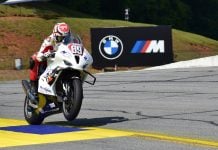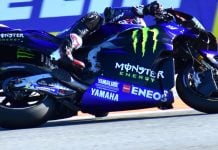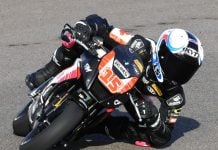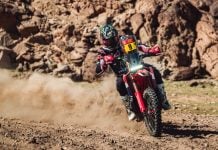One year ago the state of professional motorcycle road racing in America was depressing. The AMA Pro Superbike Championship series only had six rounds, it had no TV coverage, the paddock was losing teams and what teams remained were losing sponsorship and motivation. And the rights holders of the series, Daytona Motorsports Group (DMG), offered nothing to give its stakeholders and sponsors any hope of things improving in the future.
Then in September of 2014 it was announced that the KRAVE Group, led by three-time 500cc GP World Champion Wayne Rainey and his partners Richard Varner, Terry Karges and Chuck Aksland, had secured the rights to promote professional motorcycle road racing in America and would do so in 2015 under the name MotoAmerica.
In less than a year, the KRAVE Group put all of the infrastructure in place to run America’s premier motorcycle road racing series, got it on TV on CBS Sports Network, maintained live flag-to-flag coverage streaming over the Internet, expanded the schedule out to nine rounds (including three shared events with the FIM MotoGP and Superbike World Championships), and introduced a popular new class in the KTM RC390 Cup.
Prior to the first event of 2015, Roadracing World interviewed MotoAmerica President Wayne Rainey, and in that interview we asked him how he would measure the success or lack thereof of MotoAmerica. Rainey said he would measure their performance by the feedback he received from those who work full-time in the MotoAmerica paddock.
With six of the nine 2015 MotoAmerica events complete and planning for the 2016 season right around the corner, Roadracing World went through the paddock at Mazda Raceway Laguna Seca and asked several team owners and managers how they felt MotoAmerica had done in 2015 and what areas they would like to see more improvement in going forward. Among those we interviewed, we found a very positive view on what MotoAmerica has done so far and strong optimism for the future.
Don Sakakura, Senior Vice President Yoshimura R&D of America and leader of Yoshimura Racing in America, including the Yoshimura Suzuki Superbike team: “We’re very pleased. I think from the team standpoint we’ve had some issue with timing and scoring, which I think they addressed at Miller and they are working on a new system or an updated system. The teams having accurate timing and scoring information is very, very critical.
“Honestly, other than that, we’re very pleased. We’re pleased with the venues. We’re happy to be back here at Laguna Seca and to be racing at the MotoGP events and racing in front of spectators. I think that’s something we’ve wanted to see improve over the year. They recognized that, and with their affiliation with FIM it’s making that possible.
“I don’t see anything really negative so far. They have good people in place, the people they’ve brought in to handle media, marketing, their website. Bringing motorcycle-experienced people in and placing them in the key roles that they have I think is going to work very well.
“I think one area [of improvement] we always discussed in the past was consistency with the rules and procedures. Now, again it seems to be very solid. The group that they’ve brought in are very experienced individuals who have done this a long time. To us as a team that’s very, very important.
“The TV [package], I think that will come in time. I think they’ve invested very heavily into what we have now. I see that in the manpower they have in place. I think we can’t ask for too much too quickly. I think in time as the racing becomes more popular the TV will be an important role, but I think the on-site organization is very solid right now.
“Obviously, some time is going to be required to attract some more spectator interest. There were a couple of events we had some weather issues. It’s sad to say that at a couple of events we would have done better had it been a sunny day, but again the effort is there and the people are in place. I just think over time it’s going to work. We’re all in.”
Keith McCarty, Yamaha Motorsports Racing, Division Manager and leader of the Monster Energy/Graves/Yamaha Superbike and Yamalube/Y.E.S./Graves Yamaha Supersport teams: “First of all, it was a breath of fresh air for us [to see] the management side deeply engaged in the paddock. Every race has been the same. They make themselves visible, they talk to a variety of people, they get a lot of information.
“That’s good and it’s bad. It’s good because you have your finger on the pulse. But there’s a varying degree of opinions, and when you’re trying to make improvements it’s impossible to encompass every request. When you look at the majorities and the things that make sense at this stage of the game I think from the paddock the interaction is great, very solid, very consistent. We like all of that.
“For all of us who have been here for a while, I don’t think that the racing has ever been broken. Regardless of how bad the relationships were the racing that we provided has always been good. Varying degrees in different classes, but I don’t think anyone can ever argue that. The missing point is the people that come to the events.
“The first several events were rain events. You know immediately that will really knock your attendance down, but [MotoAmerica] made some good decisions at all of those events. And those are other things we look at, right? They made good decisions quickly and they made them for the right reasons, in the interests of safety, and we were able to put races on in the rain, which is something we’ve always wanted to do. That will kill your series quicker than anything, if you can’t race in the rain.
“By all those accounts I give them an A. I think they’ve done a great job.
“The part that I think we still need to work on is the marketing of the events. I think it’s tough to have all cylinders firing. They came into this very late. We give them a lot of credit for still making this season happen. What they said they were going to do they are doing it. We love that.
“To pick on them for any one thing would be unjust in my mind, but I think they know the difficulty ahead is finding that marketing key to get people at the tracks in 2016. We have to do a better job of getting people at the track, and it’s not just the KRAVE Group or MotoAmerica. Every team in the paddock has to do their job to be at press conferences and be out there in the public prior to the event. There’s still work to be done, but it’s not only by them. They’ve done everything they said they were going to do.
“The timing and scoring at the beginning of the year, I think some people will probably ding them for that. Having been in the situation where you have all of the information in front of you and you make a decision, they did that. To sit here and go, ‘they should have done the other one,’ after the fact, is crazy. They did it, and they thought it was going to be good, and I think on some sides of it it was good. The registration side, the master side, Nicole Cox’s side was very good. But from the paddock and the scoring and probably the fans’ side, that was probably a bit weak. They took a chance, they did their best, they recognized it wasn’t right, they changed it. No problem. I’ll take that any day of the week.
“For me personally, they’ve doing a great job. They’re a great group of guys. I’m looking forward to 2016.”
Keith Perry, Crew Chief/General Manager Team Hammer and leader of the GEICO Suzuki Superbike and M4 SportbikeTrackGear.com Suzuki Supersport teams: “I’m pretty much in favor of almost everything they’ve done. I think the classes are good, although I think they’re a little bit expensive for our economy and our situation was going to allow. But we knew that upfront. I still have mixed emotions about it. Naturally, I like the rules for the most part. I like the way everything is being run for the most part.
“I feel like they’re not doing as good of a job communicating some things that the previous regime did. We’re not getting nearly as much information that we used to get. I really don’t like the fact that everybody doesn’t go to a rider’s meeting [every weekend]. There’s issues at every racetrack that we need to talk about to make sure everyone’s on the same page. If you’re not an entrant or a new rider you never have to go to a meeting. I think there needs to be some tweaking in that area. So to me, communications, they get a C because I don’t feel we communicate as well as the previous regime did.
“As far as running the races we haven’t had any issues there. They’ve done a good job with that.
“I want to see where things go from here. I want to see what decisions they make after seeing how things went this year and which way we go from here.
“I think one big, big issue they’ve had all year and it’s taken all year to sort out is the timing and scoring. Timing and scoring has been a disaster. We haven’t had nearly the amount of information available to teams on pit road this year that we’ve had in years gone by. They’ve definitely taken a step backwards in the scoring department, and we’re still deficient compared to what we’re used to. That part definitely a D or worse. That needs to be looked at and improved.
“The other issue we have is the TV package. Everybody that I’ve talked to that has watched those shows think they stink, absolutely stink. They’re absolutely worthless. You don’t have to get to see any of the 600 races, which a lot of the fans are interested in. The 600 racing in the past has been the best racing, the most competitive. And the quality of the program isn’t that great, and the content isn’t that great. So the TV package needs to be looked at, and I understand that it comes back to money. I haven’t heard any sponsors who like what the TV package is doing.
“But we have a series, and to me that’s a success. Now we need to go forward.”
Danny Walker, owner of the RoadRace Factory/Red Bull Superstock 1000 and RoadRace Factory Supersport teams: “I think it’s two thumbs up from our standpoint. For me, has everything they’ve done been 100% perfect? No. Have there been mistakes? Yeah. But the great thing about these guys is they own up to them. They’re not hiding from you. When we have a problem I see Wayne [Rainey], I see Richard [Varner], Chuck’s [Aksland] always walking up and down pit lane. And they’re able to make decisions and fix stuff. I think it’s 100% better. We’re feeling so much better about how things are working now.
“The timing and scoring was probably the biggest issue we had for a while.
“This weekend we just brought in $6000 in team apparel they’re going to start selling for us in their apparel tent. That’s something we could have never done with the old crew [DMG]. They wanted no part of that. I say two thumbs up. I’m pretty excited about it. It’s definitely getting better, and more and more people are wanting to get back involved again.
“I think one of the biggest drawbacks we’ve had for a long time and still is [the series] helping their participants bring in outside sponsors. They’re going to have to start getting involved in actively reaching out to other people and bringing those to us. We can’t all keep trying to pull out of the same gene pool. It just doesn’t go anywhere. So I think they’re going to have to find some good folks who can go outside of the industry and start enticing other people to come into the industry, bring them in and help us with that.
“They can’t be hording all of the sponsors for themselves. That’s the problem we’ve had in the past. Any teeny, tiny, little sponsor we’ve brought in the sanctioning body wanted a big chunk from them to make their two cents, and that didn’t leave a penny for the rest of us. They need to go actively find people to get involved in the series and bring them to us and help support our teams. If we keep having to do it on our own with no help from them we’re just going to end up going down the same path we have been before. There’s no way we will survive if we have to rely on the industry that we have to support this. There’s no way.”
George Latus, owner of the Latus Motors Racing/Castrol Triumph Supersport team: “I think they’re doing a great job. We came into the series knowing it was brand new and that there would be some teething pains and so on with it. And sure enough there were, but it was nothing that was a super big deal for us and they’ve corrected a lot of things and we enjoy the people who are here. So I think it’s a great series, and I’m happy with it.
“I think the things they maybe came up short on was maybe there was some confusion at registration and there was obviously the problems with timing and scoring. But the good thing is the folks seem willing to address those things quickly and make correct things happen. Thus far, I think they’ve done great with that.
“There’s a lot of positive vibes about the series, and I think the KRAVE Group brings so much credibility into the thing and that’s going to do nothing but help the series grow.
“I think timing and scoring is an ongoing thing with them. Same thing with being able to do a lot of registration and so on via the internet. That hasn’t happened as well as it could have. But as far as the racing program, how the thing is being run, the rules package and so on, I think it’s really good.
“A better TV package would be appreciated. I like the idea of having the Superstock 1000 [class]. I think that’s going to bring manufacturers in. I think that’s a neat class. I wish there was more exposure for the Supersport 600 class. The DMG group put a lot of emphasis on that class, and that’s where we compete, so we got a lot of good coverage out of that. We see less of that with MotoAmerica, but I don’t necessarily think that’s a bad thing. Most of the emphasis is on the liter bikes, and I think that’s the future. I think that’s where you’re going to see manufacturers coming back in. Once we can get all of the manufacturers back in, I think the sport will be healthier for it.”
Chuck Giacchetto, Team Manager Yamalube/Westby Racing: “They’ve done good. All the partners have done good, and I think there’s a new sense of camaraderie in the paddock amongst the teams. It think everyone has joined hands in moving forward. I don’t want to say everything’s perfect, but it’s pretty darn good. And the nicest change for me personally is the communication. The communication between the owners and the team managers and people on the crews has been exceptionally good. There really hasn’t been any surprises. Frankly, we expected a lot of surprises. They’ve been very open. There hasn’t been this cloak and dagger society.”
Kyle Wyman, Team Owner/Rider Millennium Technologies/Kyle Wyman Racing: “From any perspective at all, I think they’ve done a really good job. Their communication with us is a lot better than in the past with some other series. Everything is clear. And they seem to put the teams first. We don’t feel like customers. We feel like partners, and I think that’s the way it should be. I think that’s huge.
“I’m looking forward to what they can build on for a TV package in the future and getting our faces out there a little bit more, all of our faces out there, not just Superbike. For me at this point I’m looking at the amount of exposure that Superbike and Superstock 1000 get and I’m considering moving into that class just because of the amount of exposure I can get my sponsors. I don’t think that should be the only deciding factor. We should have a choice of what we ride. I think we need diversity in the paddock. I think people are seeing so much exposure weighed so heavily toward Superbike and Superstock 1000 that we all want to be in that class now.
“I also like the fact that MotoAmerica has made it slightly harder to get a Pro race license. I feel that adds value to our investment in the series and what we are doing because not just anyone can come out here and do this.”






